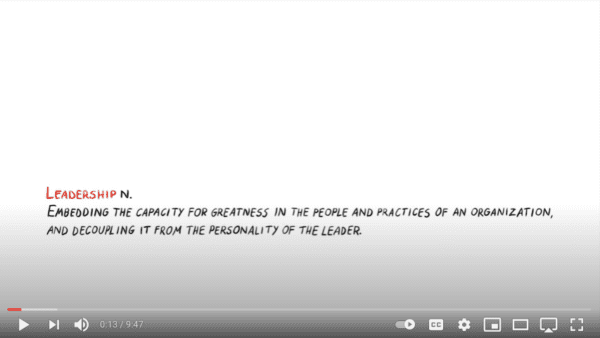How to Coach
How good are you at coaching your team? Asked this question, many managers will say ‘pretty good’. However, a study published in the Harvard Business Review showed that managers consistently over-estimated their own ability to coach This is mainly because most managers and leaders misinterpret what is meant by coaching. Coaching is often an over-used word within organisations and can be used to mean everything from training someone to giving advice or even telling them what to do.
So if you want to know how you, your team, and your organisation can benefit from you really coaching at work, read on.
What is Coaching?
The ‘father’ of coaching, Sir John Whitmore, describes coaching as ‘unlocking a person’s potential to maximise their own performance’. But what does this really mean? And how do you do that?
Coaching is at one end of a spectrum of ways in which we can help others – whether that’s about learning something new, solving a problem or achieving a goal. At the other end of this spectrum is the most direct form of helping: simply telling someone what to do.
In between telling and coaching, is a myriad of ways of helping others which we use every day without even thinking about it: instructing, training, guiding, advising, suggesting. With all of these options, you are helping to solve the other person’s problem for them. The biggest difference, and benefit, with coaching is that you are helping the other person to solve their own problem.
Open Questions
We do this by asking powerful open questions and listening deeply to the coachee. In doing so, we are encouraging them to explore their issue or goal and look at it from a variety of angles, to help them consider options they hadn’t before, and to take responsibility for the choice they make and the outcome of that choice.
This might sound anything but helpful. Why would we leave someone to sort their own problem out? Surely they’ve come to us because they need help, and it sounds harsh to sit back and let them figure it out. But consider how many times you have given your advice or opinion to someone and they haven’t taken it? Or they’ve done it, and it hasn’t worked out well, so they still have their issue?
The challenge with trying to solve others’ problems is that as human beings, we are coming at that problem from our own perspective, with our own experiences, values and biases. Which invariably is not the only way of looking at or solving an issue. By using coaching instead, we can enable our employees to develop new insights, challenge their own thinking and consider options they hadn’t previously.
When Should You Coach?
What makes coaching so powerful is that you are enabling your team member to learn, become more confident and develop their resilience. There is absolutely a place for telling, suggesting and advising – the skill is to know when this is, and when to coach.
Managers will need to be more directive when they have someone who is very inexperienced or brand new to their role. One of the golden rules of coaching is that the coachee needs a degree of ability and will to resolve their own issue. However, you can still use coaching questions to ascertain the team member’s level of knowledge and experience before giving further direction. Indeed, you can use coaching more often than you think. As a professional coach, I remain in the coaching space for the entire session with my clients.
As a manager, you can move up and down the spectrum between coaching and telling even in the same conversation. The reason we spend a lot of time developing the coaching skill set with managers is because no-one I’ve ever come across has needed help giving advice or making suggestions! We spend most of our lives in this part of the spectrum of helping, even when we don’t realise it. Coaching requires practise and skills development, but even with very little training, managers can start to use coaching questions in their everyday conversations which will make those conversations more fruitful for both parties.
Sticky Learning ® is 7 times more effective than 1-day training courses. Plus, you will get a Chain of Evidence proving your Return on Investment. Discover soft skills training that changes behaviours long term.

What are the Benefits of Coaching?
There is a myriad of benefits of coaching at work – for employees, for the manager and also for the organisation:

Benefits for Employees:
- Increased learning and development of knowledge and skills
- Increased confidence and motivation
- Feeling empowered and engaged
- Increased autonomy
- Increased self-reliance and agility
- Improved performance
Benefits for the Manager:
- Higher performing team members
- Reduced pressure to ‘have all the answers’
- Able to delegate more often to team members
- New ideas and creativity within the team
- Team more open to change
- More time
Benefits for the Organisation:
- Organisational performance improves as individuals’ performance improves
- Creates a learning organisation – learning is quicker and spreads throughout the organisation without relying purely on formal methods
- Teams work more effectively together
- Increased engagement and retention
- Increased innovation and creativity
- Teams are more open to change
- Leaders’ time can be utilised more for business improvement and future-focussed thinking
One of my favourite examples of the power of coaching in action is by David Marquet in his book ‘Turn the ship around!’. Watch this video to see how he used coaching on a US Nuclear Submarine with brilliant results…

So How Do You Coach?
You may think that you need certain qualities to coach others. The good news is, everything you need to be a successful coach can be learned. You may have heard that there are different styles of coaching, but ultimately whatever the specific approach that might be taken, the principles of coaching is the same. Effective coaching is a combination of skill, emotional intelligence and good judgement.
Skills
Active Listening
Most of the time we listen selectively. We have so much else going on in our heads that we only hear part of what someone is saying. Often, this is the part we either want to hear or the part we are looking for in order to respond and move the conversation on. We’re so keen to resolve the issue, we don’t pick up on the undercurrent of what’s really going on – and so we often offer a solution which doesn’t solve the real problem.
When we coach, we need to actively listen by giving our whole, undivided attention. We are listening not just to the words someone is saying, but how they are saying it – their tone, their body language, the pauses. Active listening tells us so much more about what is going on with someone than when we are doing our normal every day listening. Active listening also helps us to build empathy – a valuable and key element of effective coaching. It takes practice – so start today by really attentively listening to someone.
Asking Open Questions
Open questions (any question which begins with What, Where, How, When, Who or Why) are the main types of questions we use in coaching. Using open questions enables the team member to consider and explore fully the issue. Consider the difference between these questions:
“Have you spoken to your line manager?” and “Who have you spoken to about this?”
The first question is a closed question, leading to a yes or no answer and it’s also an implied suggestion. If the answer is “No,” the obvious response would then be: “Well why don’t you speak to them and see what they say?”. This is one possible route to the solution.
The second question not only establishes what the team member has done so far, but it also elicits the follow up question: “Who else could you speak to?”. This leads to multiple routes to the solution.

Another effective way of asking questions is a slightly softer “Tell me…”. For example:
“Tell me what you know about this already.”
“Tell me what your thoughts are about this.”
“Tell me how you think that went.”
Practice asking open questions in your everyday conversations and notice how the conversation alters as a result. As a note, I would personally avoid asking a ‘Why..?’ question as it can sound accusatory even when you don’t intend it to.
Structuring the Conversation
A coaching conversation is a conversation with a purpose – to explore, clarify and come to an action or conclusion. In order to manage the direction of the conversation, many coaches use a structure to help them to keep track of the conversation and manage the coaching process.
The most well-known process for this is called the GROW model. GROW stands for:
Goal – what is the outcome or goal you want to achieve?
Reality – what is the current situation? What have you tried already?
Options – what options are there for achieving the goal or outcome?
Will/ Way forward – what will you do now as a result of this conversation? How motivated are you to do this?
As a manager you can use this coaching process in your conversations. It can feel uncomfortable at first, but with practice, it comes more naturally and your team member won’t notice that you are using this process to keep the conversation structured and as useful as possible.
Emotional Intelligence
As well as key skills, successful coaching also requires a high degree of emotional intelligence. The main thing that gets in the way of effective coaching is ourselves.
Self-awareness
If we are not aware of how we are listening, asking questions or impacting our team member, we will not be able to coach effectively. We’ll slip into asking closed questions; we won’t pick up on the subtleties of what is being said, or not said; and our team member may realise that we’re not fully focussed on them. So self-awareness is key. We can develop our self-awareness by becoming conscious of how we are holding conversations. Gathering feedback from others is also invaluable.
Self-management
If we are tired, stressed or feeling overwhelmed, we will find it very difficult to coach. Coaching requires emotional head space. So managing our emotions and stress levels is crucial. Realising that you aren’t currently in a place to coach effectively is one of the most important things you can do as a manager. Some simple tactics such as taking a break, getting some fresh air or even getting something to eat can help. Sometimes, you might want to delay your coaching conversation for a few hours until you are able to give your team member your full attention – and they will appreciate your honesty more than if you rush through a conversation with them just to get onto the next thing on your list.
Empathy
Building rapport and trust between ourselves and our coachee is crucial for effective coaching, and developing empathy is a key way of doing this. If your team member senses that we don’t (or won’t) understand where they are coming from, they will feel less willing to be open and honest and the coaching conversation will be less effective. Empathy is the ability to be able to understand how someone feels in a given situation – even if we don’t or wouldn’t feel the same.
Remembering that everyone is unique and respecting how they feel is therefore key to developing empathy. Tapping into your own emotions and recalling how it feels to be angry, distressed, indignant, frustrated, delighted, proud etc also helps us to empathise with others.
Judgement
Knowing when and when not to use coaching is an important judgement call. Coaching is only effective if the person wants to be coached. If the team member doesn’t have the knowledge, experience or confidence to develop their own solutions, then using another way of helping them might be more appropriate. Mentoring is a good solution for this, because you can use a coaching approach (i.e., active listening, asking open questions). But also offering advice and suggestions based on your own experience.
In genuine emergency situations or where there is a clear important policy or procedure, coaching isn’t appropriate, as either time or protocol determines a particular path to be taken. However, once the situation is over, coaching can be used to help reflect on and learn from the situation.
Take These 5 Actions to Learn How to Coach:
You can start learning to coach straight away, by taking these 5 actions:
- Become aware of how you are listening in your day-to-day conversations.
- Start practising active listening.
- Listen to your own questions during conversations – are they closed or open?
- Start to convert your current closed questions into open questions.
- Encourage your team member to explore their own options to address their issue before offering your own suggestions.
Why Don’t Managers Coach More Often?
Managers often think they are coaching when they’re not, and even when they have received training to understand what coaching is and improve their coaching skills, it’s still really hard to do. Coaching takes practice and creating new habits because we’re using under-utilised skills. Managers and leaders are incredibly busy, and one of the things they don’t have a lot of is time. They believe that coaching someone takes more time than simply telling them what to do. In the immediate term, they are often right. However, in the medium to long term, coaching saves them time and energy as they equip their team members to become more self-sufficient.
Another common (but less visible barrier) is that many people enjoy helping others by imparting their own knowledge and experience. We like to see ourselves as being helpful and knowledgeable, and coaching can feel like these attributes aren’t being used. If this sounds like you, I would encourage you to consider the benefits of coaching outlined above, and to start small. Simply begin by noticing how you are listening, how you are asking questions and how your typical conversations go. Then start to develop your active listening and questioning skills. Remember, helping someone by coaching them is much more effective in the longer term. Taking these small steps will make you a better coach in the workplace and bring countless benefits to you and your team.




